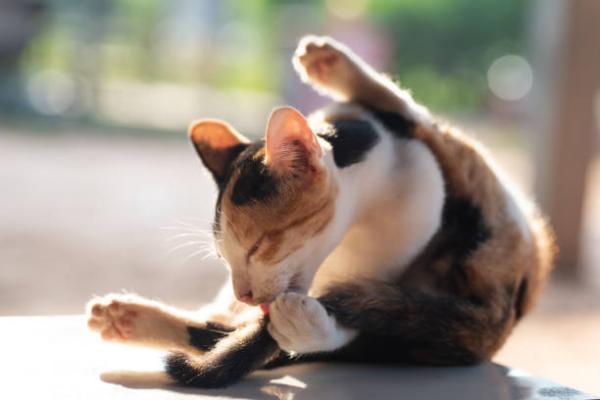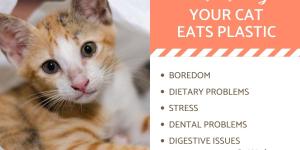My Cat Smells Bad - Why and What to Do



See files for Cats
Our cats are very hygienic animals which dedicate large portions of their day to grooming. Most generally try to avoid water and will be very wary of any odorous objects or areas in the home. For this reason, when a cat smells bad, it can lead their guardians to worry something is wrong. Since a foul smell can be related to a health issue, it is important we don't ignore a cat emitting foul smelling odors. Take the cat to a veterinary clinic for an accurate diagnosis and administration of appropriate treatment.
At AnimalWised, we explain why may cat smells bad. We look at the potential causes of your cat emitting a foul odor and what possible treatments may correspond.
Does my cat smell bad?
Before knowing why and what to do about it, we need to ensure they do actually smell bad. As with humans and other animals, cats will have a particular odor characteristic of themselves. Other cats have a much stronger olfactory ability and will be able to recognize each other by scent alone. Humans do not have the capacity to do so. The result being that a healthy cat's odor should be relatively mild.
If you are unsure whether your cat smells bad, it is possible they don't. When a cat has a foul odor due to illness or poor hygiene, we will be able to tell. The odor should be strong and unusual. To humans, the natural odor of most cats will be reminiscent of fresh hay, conveying cleanliness and serenity.
Cats have their smell due to spending a lot of time grooming themselves. The saliva on their tongues has a deodorant component which they then spread all over their body. In addition to maintaining hygiene, cats groom themselves due to a survival instinct. By licking themselves, they can erase strong odors which attract predators. When a cat stops licking themselves, it means there is a problem.
Bacteria, toxic substances or dying cells can cause a cat's odor to become foul. Often these smells may be reminiscent of decaying fish, urine or something equally pungent. For this reason, a cat will smell bad if they have a problem. We explain what these problems may be below.

Reasons my cat smells bad
When your cat smells bad, you may notice when they rub against your face or even if they are further away from you. However, we should also be observant of any other symptoms which help us to understand the root cause of the problem. We share some of the most common reasons why a cat smells bad below:
Otitis
Ear infections and inflammations, in addition to being very painful for your feline, produce a very unpleasant odor. The reason for this bad smell is the accumulation of earwax, secretions and microorganisms. You may suspect your cat has an ear problem if you see them scratching at their ears a lot or moving their head from side to side. You may even be able to feel their ears are warm to the touch.
Otitis in cats is often caused by ear mites, especially Otodectes cynotis. They can also be caused by microorganisms such as bacteria and some fungi which proliferate in the ear canal. Swelling and infection can also occur when foreign objects enter through the outer ear. Providing weekly cleaning of your cat's ears can help avoid ear problems and otitis.
Halitosis
Halitosis is the term for bad breath and can be a possible cause of bad smells in your cat. Mouth odor can be due to problems with the teeth or gums, such as tartar, gingivitis, periodontal disease, tooth decay or chronic feline gingivostomatitis. The latter can be seen when the cat has red and swollen gums.
In addition, foreign bodies in the mouth, accumulated remains of food or sharp objects can cause wounds or injuries to the soft tissues of the mouth. This predisposes our cats to bacterial contamination. The consequent infection can cause an oral abscess which results in a secondary bad odor.
Digestive problems
Poor gut health can cause your cat to have flatulence and give off unpleasant-smelling gases. Some foods that can cause intolerance and digestive problems in cats are milk and grains. Intestinal and stomach diseases or digestive infections and parasites can also produce this effect.

Incontinence
Urinary or fecal incontinence occurs when the cat cannot control their urethral and anal sphincters. It leads to uncontrolled urination and defecation and are a clear cause of body odor. This incontinence can be due to neurological problems, physical trauma and other reasons. It is more common in older cats and the cumulative effects of age.
Anal glands
These glands are located under the tail of our cats, to the sides of the anus. They secrete a foul-smelling liquid which helps them defecate, as well as mark their territory. The problem appears when the anal glands become impacted or infected. The build up of anal secretion and pus from a bacterial infection causes a very unpleasant smell. Antibiotics may be required to stop infection, but often expressing the glands will be enough.
Sexual maturity
When they become sexually mature, non-neutered male cats begin to emit an intense smell characteristic of the action of the hormone testosterone. For this reason, if you have a young cat that is giving off a stronger and somewhat unpleasant smell, it may be have a hormonal cause.
Skin problems
Ulcerations contaminated by deep tissue damage can cause a bad smell in cats, as can fungi or certain types of dermatitis. External parasites also predispose to skin infections and the production of body odor in felines. The cat will need to be taken to the veterinarian for specific treatment such as deworming.

What to do if my cat smells bad?
Each of the above reasons why a cat smells bad will have their own specific treatment. However, there are some things we can do to both encourage proper hygiene and prevent our cat from emitting foul odors. They include:
- Provide any addition hygiene they may need, including teeth brushing and ear cleaning. Cats generally do not need a bath, but they can need one if they have become particularly dirty.
- Digestive problems can be prevented by feeding your cat with the correct diet for their individual needs.
- Keep a clean and hygienic home and do not put any toxic substances in areas the cat can access.
- Deworming is also key to avoiding parasites that can cause direct skin damage and predispose to infections that cause body odor.
- Although cats will look after themselves, we will need to brush our cats regularly to remove dead hair and help condition their coat. This is especially important in longhaired cat breeds.
- It is also important that they drink enough water since drinking too little can cause bad breath by reducing the formation of saliva. Saliva is key to washing away the bacteria that cause bad odor.
- On the other hand, your veterinary center will give you specific treatment guidelines according to the health problem your cat is suffering from. The use of drugs or diet and lifestyle changes may be necessary.
This article is purely informative. AnimalWised does not have the authority to prescribe any veterinary treatment or create a diagnosis. We invite you to take your pet to the veterinarian if they are suffering from any condition or pain.
If you want to read similar articles to My Cat Smells Bad - Why and What to Do, we recommend you visit our Other health problems category.
- Cartagena, J. C. (2021). The 105 most frequent consultations in the veterinary clinic. Grupo Asís Biomedia, SL







